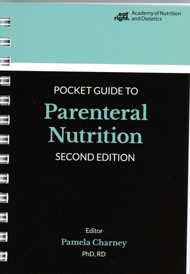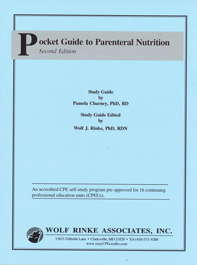|
Pocket Guide to Parenteral Nutrition, Second Edition
| C332 |
16 CPEUs |
HARD COPY |
Currently out of stock.
New inventory coming soon. |
|
An evidence-based CPE activity for determining the need for parenteral nutrition (PN), ordering nutrient solutions, monitoring patient response to therapy, and coordinating care with patients, caregivers, and other members of the healthcare team. More specifically you will be better able to:
- Communicate potential risks and benefits associated with PN;
- Problem-solve mechanical, biochemical, and physical complications associated with PN;
- Correctly diagnose nutrition problems that are associated with the need for PN;
- Recommend vascular access for patients receiving PN;
- Ensure that patient tolerance of PN is optimized and nutrient needs are being met.
Share with a friend and Save! Click here for important information about
sharing.
To order an ADDITIONAL Reporting Form click below:
C332F |
16 CPEUs |
REPORTING FORM |
Currently out of stock.
New inventory coming soon. |
|
Pocket Guide to Parenteral Nutrition, Second Edition
© 2024 Wolf Rinke Associates. All rights reserved for this self-directed accredited learning activity. Reproduction in whole or part without written permission, except for brief excerpts, is prohibited.
LEARNING OBJECTIVES
Upon completion of this CPE program you will be better able to:
- Recommend parenteral nutrition regimens that meet the unique nutrient needs of each patient;
- Apply findings from recent research when caring for patients receiving parenteral nutrition;
- Communicate potential risks and benefits associated with parenteral nutrition;
- Apply knowledge about nutrient metabolism to writing orders for parenteral nutrition;
- Ensure that recommended intakes for macro and micronutrients are met via parenteral nutrition solutions;
- Assess patient nutritional status;
- Correctly diagnose nutrition problems that are associated with the need for parenteral nutrition;
- Calculate macro and micronutrient requirements for a variety of patients receiving parenteral nutrition;
- Problem-solve mechanical, biochemical, and physical complications associated with parenteral nutrition solutions;
- Recommend vascular access for patients receiving parenteral nutrition;
- Evaluate the impact of nutritional status on nutrient requirements for parenteral nutrition;
- Ensure that all nutrient needs are met for patients with various medical/surgical conditions who are receiving parenteral nutrition;
- Determine the need for additional additives for patients who have unique nutrient needs;
- Recommend strategies for managing parenteral nutrition during periods of product shortages;
- Determine monitoring schedules to ensure that patient tolerance of parenteral nutrition is optimized and the patient’s nutrient needs are being met.
ABOUT THE AUTHOR OF THE POCKET AND STUDY GUIDE
Pamela Charney, PhD, RD completed her undergraduate studies at the University of West Florida and was a dietetic intern at Walter Reed Army Medical Center. She served as nutrition support dietitian, pediatric dietitian, and clinical nutrition manager at Madigan Army Medical Center before beginning work on her Master of Science at the University of Washington. She has over 20 years’ experience in nutrition support in adult and pediatric care in a variety of settings ranging from small community hospitals to large, tertiary teaching medical centers. She has also managed clinical nutrition departments, nutrition support teams, and multi-disciplinary clinics for children with special health care needs.
Pam completed her PhD at Rutgers University and has worked as a consultant in the areas of nutrition informatics, evaluation of healthcare quality, and evaluation of clinical information systems. She completed a second Masters’ degree in Clinical Informatics and Patient Centered Technology at the University of Washington and is now Department Head, Interdisciplinary Healthcare and Program Chair, Healthcare Services and Informatics Administration at the University of North Georgia. She is also a peer reviewer for the Quality Matters program.
She has extensive volunteer service to the Academy of Nutrition and Dietetics (AND) and the American Society for Parenteral and Enteral Nutrition (ASPEN), including serving on the Board of Directors for both organizations. As a charter member of the Standardized Language Committee for AND, Dr. Charney is considered an expert in nutrition and clinical informatics, nutrition diagnosis and use of standardized terminology in clinical care. In the past she served as a member of AND’s Research and Quality Management Committees and was elected to AND’s House of Delegates as a member of the House Leadership Team.
In 2008 she became a member of the American Medical Informatics Association (AMIA) Education Committee and has served as member-at-large for AMIA’s Clinical Information Systems Working Group executive committee. She was also a member of the Outreach and Working Group Steering Committees. She currently serves as a member of the Scientific Program Committee and is a reviewer for scientific abstracts submitted for AMIA’s annual symposium.
She has received many awards and honors, including AND’s Award for Excellence in Clinical Nutrition, DNS’s Distinguished Nutrition Support Dietitian Award, ASPEN’s Outstanding Nutrition Support Dietitian Award, and the ADAF Medallion Award. In 2008 she was named Outstanding Alumna by Rutgers University. She is the first dietitian to be selected to receive a National Library of Medicine Fellowship to attend the Biomedical Informatics Short Course at Woods Hole, and was an invited attendee at the Nursing Informatics TIGER meeting in 2006.
Pam is the proud parent of Jaime, Blake, and Megan as well as two Papillons who are convinced they are the parent.
ABOUT THE EDITOR OF THE STUDY GUIDE
Wolf J. Rinke, PhD, RDN is the president and founder of Wolf Rinke Associates, a company that has provided high-quality CPE programs to nutrition and dietetics practitioners since 1990.
Dr. Rinke earned a BS at Drexel University, an MS at Iowa State University, a PhD in Continuing and Vocational Education (Adult Ed) at the University of Wisconsin and interned at Walter Reed Army Medical Center. He participated in a test item writer workshop sponsored by the Commission on Dietetic Registration (CDR).
Dr. Rinke is a past Adjunct Associate Professor, Graduate School of Management & Technology at the University of Maryland, and a former Adjunct Faculty Member of the School of Continuing Studies at The Johns Hopkins University. He has served as past president of the District of Columbia (DC) Dietetic Association and has been honored by the Academy of Nutrition and Dietetics with the Award for Excellence in the Practice of Management, the Outstanding Dietitian of the Year Award, and the Outstanding Service Award, in addition to delivering the Lenna Frances Cooper Lecture.
Dr. Rinke has served in numerous leadership roles at the Academy of Nutrition and Dietetics: Chair of the Scholarship Committee for Dietitians in Business and Communications; Chair of the Communication Committee, Honors Committee, and Licensure Panel and Ethical Practices Task Force for the Commission on Dietetic Registration; Chair of the Area Coordinating Committee and Chair for the Code of Ethics; Member of the Resource for Education Programs Committee; Member of the House of Delegates; and Member of the Board of Directors.
Dr. Rinke is the author of more than 500 articles, numerous CPE self-study programs, and several popular books including Make It a Winning Life: Success Strategies for Life, Love and Business; Winning Management: 6 Fail-Safe Strategies for Building High-Performance Organizations; and Don’t Oil the Squeaky Wheel, and 19 Other Contrarian Ways to Improve Your Leadership Effectiveness.
Return to the top of page
If you prefer to order by phone, mail
or fax click below
or click here to contact us with
other questions.
For information about our other products and
services return to the sidebar at the top of the page.
|
|
|


